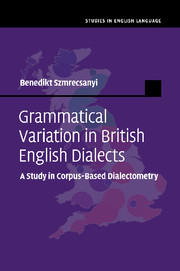Book contents
- Frontmatter
- Contents
- List of figures
- List of maps
- List of tables
- Preface and acknowledgments
- 1 Introduction
- 2 Data and methods
- 3 The feature catalogue
- 4 Surveying the forest: on aggregate morphosyntactic distances and similarities
- 5 Is morphosyntactic variability gradient? Exploring dialect continua
- 6 Classification: the dialect area scenario
- 7 Back to the features
- 8 Summary and discussion
- 9 Outlook and concluding remarks
- Appendices
- References
- Index
9 - Outlook and concluding remarks
Published online by Cambridge University Press: 05 December 2012
- Frontmatter
- Contents
- List of figures
- List of maps
- List of tables
- Preface and acknowledgments
- 1 Introduction
- 2 Data and methods
- 3 The feature catalogue
- 4 Surveying the forest: on aggregate morphosyntactic distances and similarities
- 5 Is morphosyntactic variability gradient? Exploring dialect continua
- 6 Classification: the dialect area scenario
- 7 Back to the features
- 8 Summary and discussion
- 9 Outlook and concluding remarks
- Appendices
- References
- Index
Summary
This book has advocated an approach to the analysis of naturalistic dialect data which holistically focuses on the forest and not so much on the individual trees. We called this approach CORPUS-BASED DIALECTOMETRY, or CBDM for short, and what takes center stage in CBDM is the graded differentiation of linguistic variability. This is another way of saying that CBDM is not concerned with the mere presence or absence of linguistic features in particular locations, and does not settle for merely analyzing lists of attested linguistic variants, or some such thing. Instead, the analysis in this book was based on intrinsically graded text frequencies, feature by feature, in a naturalistic dialect corpus.
The methodology's commitment to contextualized, authentic speech data (which takes the cultural and interactional nature of dialect discourse seriously) and its focus on geography as a fundamentally social factor (which approximates the likelihood of communicative contact) should appeal in particular to those geolinguists with a sociolinguistic background (or sociolinguists with an interest in geolinguistics). Quantitative variationists, linguistic anthropologists, or qualitative-interactional sociolinguists – we all stand to gain from learning more about how speech habits are patterned spatially.
It should also be emphasized, in this connection, that the breadth of the findings uncovered in this book would be hard to come by in any single feature study, no matter how interesting the feature. The holistic study of many features in many dialects, married with computational analysis techniques and attractive visualization and cartographic projection techniques, advances dialectological scholarship and yields insights and generalizations which would remain elusive to the analyst who is beholden to the philologically orthodox study of a particular dialect feature in one or two particular dialects.
- Type
- Chapter
- Information
- Grammatical Variation in British English DialectsA Study in Corpus-Based Dialectometry, pp. 164 - 165Publisher: Cambridge University PressPrint publication year: 2012



